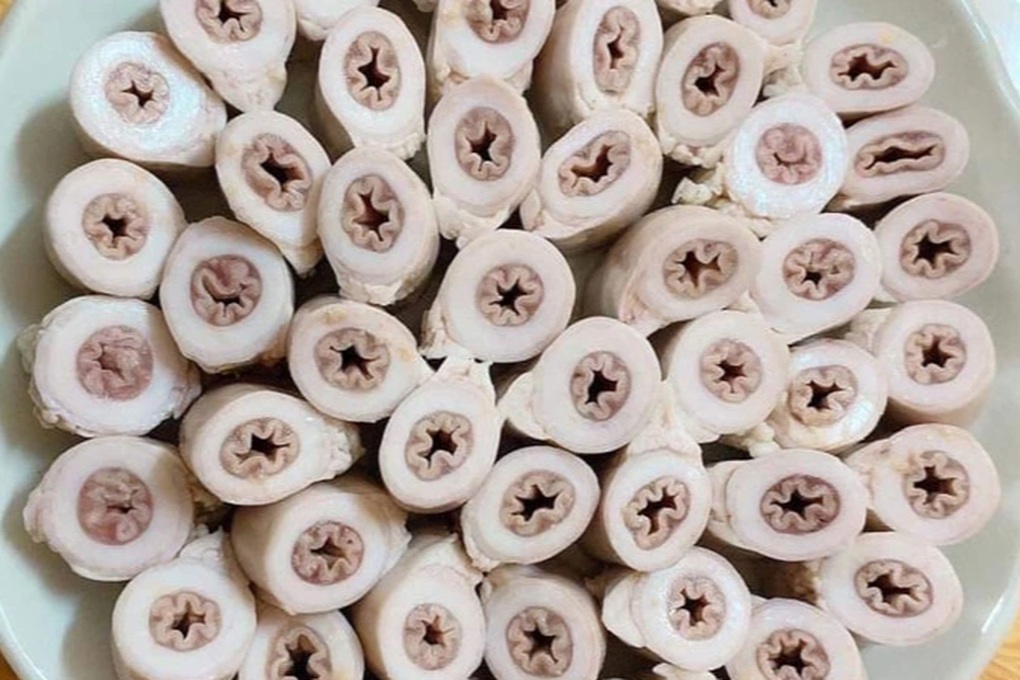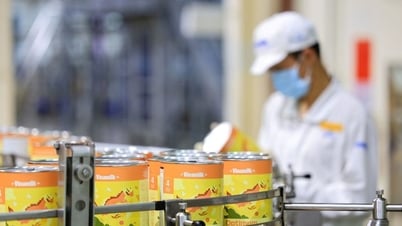Pipe intestines - the small intestine twisted into segments, has a characteristic crunchy and unique taste, is considered a rare commodity and is becoming a "stormy" dish on social networks as well as in restaurants, with increasing prices.
However, behind the cigarette fever, there are potential risks that negatively affect consumers' health.
Warning about fake cigarette butts
Nutritionist Nguyen Thu Ha, Nam Sai Gon International General Hospital, said that to meet the increasing demand from the market, in addition to natural cigarette intestines, some establishments can soak low-quality pig intestines with chemicals to turn them into eye-catching, crispy "cigarette intestines".
This process usually begins with bleaching the intestines with hydrogen peroxide to remove odor and brighten color, then using alum and diluted formalin to create crispness and keep the intestines from decomposing.
In addition, the core can be mixed with industrial glue or used with a mucosal lubricant to fix the eye-catching round shape.
According to Dr. Ha, formalin is a chemical banned from use in food processing because it can be toxic to the liver and kidneys and is a group 1 carcinogen (according to the classification of the World Health Organization - WHO).

Pipe intestines are a sought-after dish by many people (Photo: BHX).
When eating food containing formalin, users may experience abdominal pain, nausea, and acute digestive disorders. If accumulated over a long period of time, this chemical damages liver cells and increases the risk of liver cancer.
Alum (aluminum sulfate) is also not recommended for use in food. Because aluminum can accumulate in the body, affect the nervous system and is thought to be related to diseases such as Alzheimer's.
Consuming foods processed with industrial chemicals such as cigarette butts can cause many health consequences. Doctor Ha analyzes the specific risks in detail as follows:
Damage to the digestive system: Rounding agents, formalin or hydrogen peroxide when entering the digestive tract can cause inflammation and ulcers in the stomach and intestines, causing prolonged abdominal pain, diarrhea, and imbalance in the intestinal microflora.
Causes acute or chronic poisoning: People who regularly eat pig intestines soaked in diluted formalin or alum will accumulate toxins in the body, with symptoms such as fatigue, loss of appetite, weight loss, jaundice, and liver enzyme disorders (signs of liver poisoning or chronic liver failure).
Increased risk of cancer: Formaldehyde - a substance classified by WHO as group 1 - means it definitely causes cancer in humans, especially nasopharyngeal cancer and leukemia if exposed for a long time.
Effects on the nervous system and kidneys: Alum contains aluminum, which affects the central nervous system and reduces memory. In addition, the liver and kidneys are organs that must filter and eliminate toxins, so regularly eating foods contaminated with chemicals can lead to liver and kidney failure.

Doctors at South Saigon International General Hospital check people's health (Photo: Hospital).
How to distinguish real and fake pipe core?
Doctors warn that amid the wave of hunting for offal, many consumers fall into a "visual trap" with unusually crispy, pure white offal pieces that have no distinctive smell, and are products that have been "enchanted" with toxic chemicals.
Therefore, consumers need to pay close attention to evaluate food. Even though the pig intestines are carefully processed, they still have a natural toughness, ivory color and a characteristic smell. In contrast, intestines that have been treated with chemicals are often pure white, crunchy, odorless and can even easily crumble when squeezed if soaked in too much chemicals.
Some features that can help consumers identify fake cigarette cases:
Color: The inside of a fake cigarette is often pale white, uneven in color, without blood vessels or natural fat.
Crispness: The intestines are unusually crispy, even having a "crispy" feeling, quite different from the natural toughness of boiled organs.
Smell: No characteristic smell of pork intestines, sometimes has a slight chemical smell.
Surface: Excessively smooth, sometimes feels a bit sticky or like it has a coating of glue.
At the same time, people need to be careful if the intestines sold have an unusually bright white color; the intestines are soaked in water for a long time but do not become soft or change color as usual; the intestines are sold at an unusually low price or too high compared to the market price.

People should choose pork offal sold at places with clear origins and proactively process it at home (Illustration: TH).
In addition to the risk from fake cigarette intestines, Dr. Ha, Nam Sai Gon International General Hospital, confirmed that animal organs such as pig intestines are rich in cholesterol, saturated fat and high purine content. Excessive consumption can contribute to increased risk of dyslipidemia, high blood pressure, diabetes, gout and cardiovascular disease, especially in people with underlying diseases.
To ensure health when consuming dishes made from pig offal, Dr. Ha recommends that people should choose products sold at reputable addresses with clear origins, and proactively process them at home to control food hygiene and safety.
Besides, consumers need to be alert to online food trends, avoiding the mentality of chasing strange dishes and ignoring health factors.
Source: https://dantri.com.vn/suc-khoe/lam-sao-de-phan-biet-long-xe-dieu-that-gia-tranh-roi-vao-bay-thi-giac-20250507114445855.htm


































































































Comment (0)